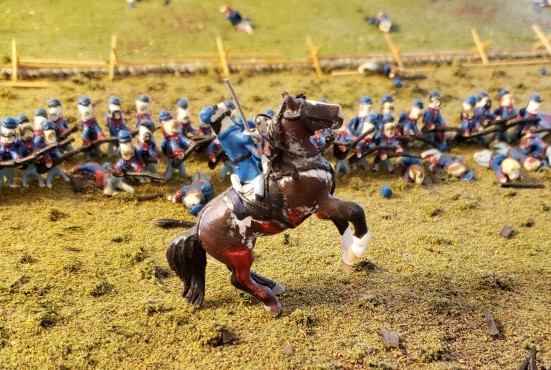
Today, we take a look at the personalities of some Civil War horses. Most of the horses below are unnamed, but the stories all show their individual characters. We might be surprised at how much goes on inside a horse’s head, if all we see is the animal dozing in the pasture. But as we read the stories of men and officers of the Civil War, we can see the sensitivity, courage, and personality of their horses. As with the men, the war brought out the mettle in the animals, showing the cowards and the heroes, the stoic and the sensitive.
 Horses might seem to just plod through life, wherever we lead them, but in fact they are highly sensitive and observant animals. Henry Kyd Douglas, an aide to “Stonewall” Jackson, recalled his horse’s distress while passing through the Antietam battlefield during the night, after the fighting had ended.
Horses might seem to just plod through life, wherever we lead them, but in fact they are highly sensitive and observant animals. Henry Kyd Douglas, an aide to “Stonewall” Jackson, recalled his horse’s distress while passing through the Antietam battlefield during the night, after the fighting had ended.
The dead and dying lay as thick over it as harvest sheaves. The pitiable cries for water and appeals for help were much more horrible to listen to than the deadliest sounds of battle.… My horse trembled under me in terror, looking down at the ground, sniffing the scent of blood, stepping falteringly as a horse will over or by the side of human flesh; afraid to stand still, hesitating to go on, his animal instinct shuddering at this cruel human misery.
On the other end of the spectrum, horses could grow used to the chaos of war, giving them what seemed almost a philosophical outlook on life. Gen. John Gibbon noted such stoicism among the artillery horses of Cushing’s batteries while the bombardment raged and some 150 Confederate cannons focused on their location.
 One thing which forcibly occurred to me was the perfect quiet with which the horses stood in their places. Even when a shell, striking in the midst of a team, would knock over one or two of them or hurl one struggling in his death agonies to the ground, the rest would make no effort to struggle or escape but would stand stoicly [sic] by as if saying to themselves, “It is fate, it is useless to try to avoid it.”
One thing which forcibly occurred to me was the perfect quiet with which the horses stood in their places. Even when a shell, striking in the midst of a team, would knock over one or two of them or hurl one struggling in his death agonies to the ground, the rest would make no effort to struggle or escape but would stand stoicly [sic] by as if saying to themselves, “It is fate, it is useless to try to avoid it.”
But sometimes, even cool-headed horses could lose it. When the bombardment began pounding Gen. Hancock’s II Corps before Pickett’s Charge, the general decided to ride along his corps’ line, to inspire the men and give them confidence. He was mounted on his usual black horse, a horse that had carried him in battle before. This time, the magnitude of the cannonade was too much for the animal and he began acting up. Unfazed, the general dismounted and switched to an aide’s tall, white-faced, light bay. With his coat flapping open to show his signature white shirt, Hancock calmly rode along his lines. Seeing their general’s example, a staff officer recalled, Hancock’s men “found courage longer to endure the pelting of the pitiless gale.” Hancock continued using the tall bay throughout the rest of his involvement in Pickett’s Charge.

Lt. Haskell on Dick
Lt. Frank Haskell, one of Gibbon’s aides, described his experiences during Pickett’s Charge in a letter to his brother after the battle. In it, he recalled the reaction—or lack thereof—of his horse, Dick, when the cannonade opened.
The General at the first had snatched his sword, and started on foot for the front. I called for my horse; nobody responded. I found him tied to a tree, near by, eating oats, with an air of the greatest composure, which under the circumstances, even then struck me as exceedingly ridiculous. He alone, of all beasts or men near was cool. I am not sure but that I learned a lesson then from a horse.
 Dick remained steady throughout the following fighting. Despite a serious wound to his right thigh and three bullets in his body, Dick carried Haskell back and forth at the gallop as the lieutenant urged men forward and summoned reinforcements to repulse Pickett’s men. Not until their duty was over did Dick lie down and finally succumb to his mortal wounds. “Good conduct in men under such circumstances,” Haskell wrote, “…might result from a sense of duty—his was the result of his bravery.” Haskell finished by expressing his wish that, if there be a Heaven for horses, “in those shadowy clover fields [Dick] may nibble blossoms forever.”
Dick remained steady throughout the following fighting. Despite a serious wound to his right thigh and three bullets in his body, Dick carried Haskell back and forth at the gallop as the lieutenant urged men forward and summoned reinforcements to repulse Pickett’s men. Not until their duty was over did Dick lie down and finally succumb to his mortal wounds. “Good conduct in men under such circumstances,” Haskell wrote, “…might result from a sense of duty—his was the result of his bravery.” Haskell finished by expressing his wish that, if there be a Heaven for horses, “in those shadowy clover fields [Dick] may nibble blossoms forever.”
Lovelly blog you have
LikeLike